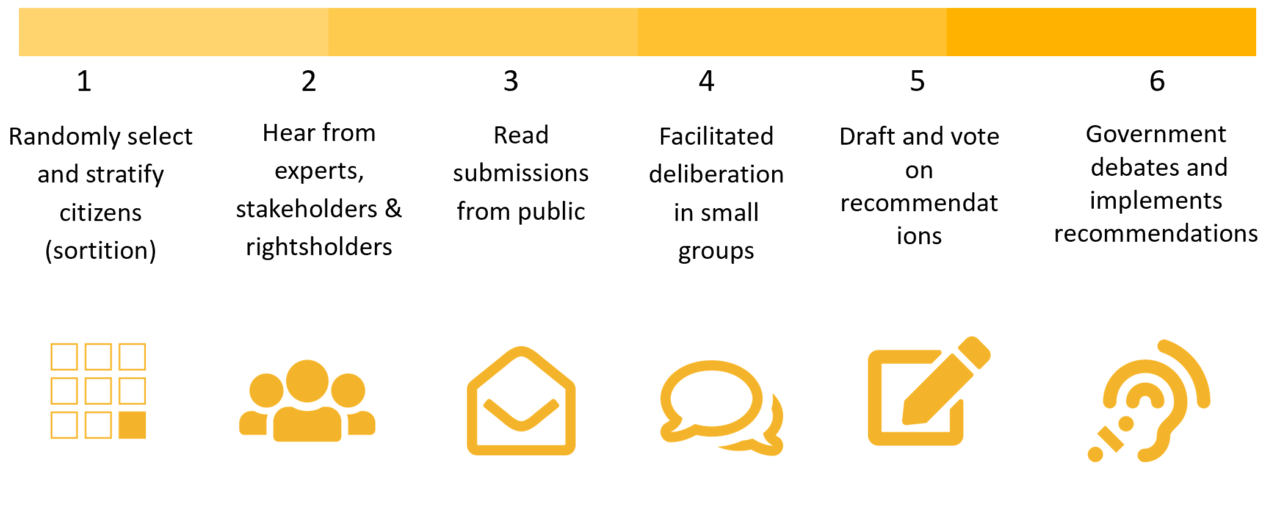The third demand of Extinction Rebellion is to ask governments (at the local, cantonal and federal level) to create and be guided by a citizens’ assembly on climate and ecological justice. This structure would allow the population to have a real influence on the decisions related to the exit of the ecological breakdown and to bring more social justice in the future.
Voting constitutes an erasure, an oversimplification of what political participation is.
- Loïc Blondiaux
The demos is those who have no particular capacity to exercise power. This is what makes democracy special […] a form of community based on the idea that the capacity each person has to think, judge and act is a capacity that he or she shares with all others.
- Jacques Rancière
In a nutshell
Who participates?
People from all backgrounds, chosen by lottery, like a jury.
How?
Set up by an independent organization.
Mini-public learns in depth about the subject.
Take into account the opinions of all parties.
Decide together on a book of recommendations.
For what result?
A vibrant democracy and a new direction for the country, chosen by people, for people.
In a democracy, the voice of the people must count.
There seems to be a disconnection from traditional political parties throughout the Western world… There can’t be an excess of democracy… And democracy should be the expression of the will of the people… We are the [informed] expression of the will of the people.
It allows you to hear what ordinary people, those who are affected by an issue, feel about it.
- Members of the Citizens’ Assembly of Ireland
More details
By the Citizens’ Assembly of Switzerland
for the ecological and climatic crisis working group
Table of contents:
What is a citizens’ assembly?
Citizen’s assemblies are part of participatory democracy, while constituting its most advanced form, that of deliberative democracy. It is a process by which citizens make political decisions on issues of public interest, such as climate and social justice. Its members, sitting in this temporary decision-making body alongside the Parliament and the Government, are drawn at random to form a representative panel of society. During this mission, participants learn in depth about the issues to be addressed, listen to experts and various stakeholders. They then deliberate collectively to finally issue recommendations and take (legally binding) decisions that will then be implemented by the authorities.
Why do we need a citizens’ assembly?
The failure of our current political system
Our government is failing to respond to the growing climate change crisis. Political participation through citizens’ assemblies adds, for the duration of the mandate, a complementary decision-making body to Parliament. Such an assembly sets up a breath in a parliamentary mechanism forced by the rhythm of the electoral cycle to give priority to short-term decision-making. It also allows a better representation of the interests of every groups of the population, within the arenas of power.
The climate emergency requires responses based on a long-term vision and that take into consideration the situation of the entire population.
A citizens’ assembly is representative
Unlike existing power bodies, a citizens’ assembly is constituted through a selection process that makes it representative of society. Participants are randomly selected from the general population, according to demographic criteria such as gender, age, ethnocultural heritage, level of education, place of residence, etc. The participants are chosen at random from the entire population.
Why is the representativeness of a power body important? When certain categories of the population are over-represented, decision-making is mechanically oriented towards defending their own interests at the expense of those of the rest of the community.
This is simply because if those in power do not resemble the governed, it is difficult for them to “think, feel, reason and act like the rest of society” (Van Reybrouck, 2014, p.101).
A citizens’ assembly is independent
The process by which citizens’ assemblies function is constructed in such a way that external actors have difficulty influencing the decision-making process. Assembly participants are thus able to make decisions based solely on their own informed views, their values and their idea of public policy for the common good.
Thus, the citizens’ assembly must be set up by the government but is not dependent on it.
The decision-making is long-term orientated
Participants in the citizens’ assembly are not chosen to represent political parties and are not pressed for re-election. Freed from these constraints, the members of the (mini-public) assembly build their own point of view by taking into account their future, that of their family and their loved ones.
Everyone’s voice is heard
During the deliberation phase, the members of the assembly meet around round tables and discuss their positions together. Facilitators ensure that everyone can speak and that no one dominates the conversation. This is to ensure that all points of view are heard. In addition, suggestions from the audience can also be included in the discussions.
How does it work?

More detailed information on composition of a citizens’ assembly are available on the website of the Citizens’ Assembly of Switzerland
for the ecological and climatic crisis.
To go further